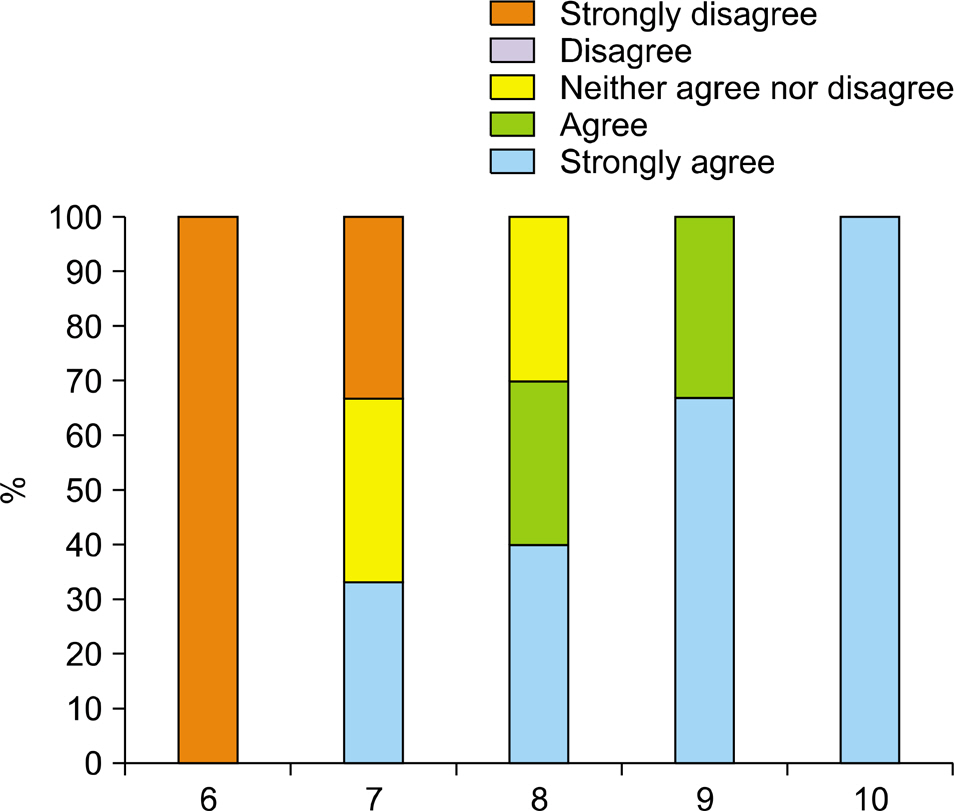J Korean Soc Transplant.
2014 Dec;28(4):219-225. 10.4285/jkstn.2014.28.4.219.
Attitude Favorability towards Organ Donation in Family Members of Brain Dead Organ Donors
- Affiliations
-
- 1Department of Surgery, Ajou University School of Medicine, Suwon, Korea. ljm3225@hanmail.net
- 2Organ Donation Center, Ajou University Hospital, Suwon, Korea.
- KMID: 1941317
- DOI: http://doi.org/10.4285/jkstn.2014.28.4.219
Abstract
- BACKGROUND
Analyzing the attitudes toward organ donation and the factors that influence such attitudes is fundamental to improving the quality of management for the process of brain dead organ donation.
METHODS
We interviewed 23 primary carers of donors after a minimum period of one year post organ donation from a single hospital, from 2008 to 2011. This telephone survey analyzed factors including relationship with the donor and the impact of such factors on making the decision for donation and attitude towards organ donation.
RESULTS
With respect to the carers' relationship with the donor, seven carers who participated in the interview were spouses (30.4%), six were parents (26.0%), three were offspring (13.0%), and seven were siblings (30.4%). Ten of the decision makers (43.4%) were not legal priority holders. Twenty-two interviewees (95.6%) experienced no regret for their decision to go through with the donation. Fifteen participants (65.1%) were willing to donate their own organs in case of brain death, and the favorability towards organ donation was significantly related to the satisfaction with their experience of medical services during the process of organ donation.
CONCLUSIONS
Organ donation after brain death is still viewed favorably by carers even after the bereavement period. Positive attitude and favorability toward organ donation were significantly related to the satisfaction with the medical service. We suggest interventions to improve the quality of medical services in order to promote organ donation.
MeSH Terms
Figure
Cited by 1 articles
-
Medical Expenses of the Family Members of Brain Dead Organ Donors and National Assistance
Jaeheon Lee, Jung Lee Won, Kyung Lee Na, Myeong Lee Jae
J Korean Soc Transplant. 2015;29(1):23-27. doi: 10.4285/jkstn.2015.29.1.23.
Reference
-
References
1). Dunn D. Motivations for giving: consent for the donation of organs and tissues. J Transpl Coord. 1995; 5:2–8.2). Lee JA, Kim SY. The knowledge and attitude of medical students towards the organ donation. J Korean Soc Transplant. 2008; 22:120–9. (이진아, 김소윤. 뇌사자 장기기증에 대한 의과대학생의 지식과 태도 연구. 대한이식학회지 2008;22: 120–9.).3). Lee SJ, Park JB, Lyo IU, Sim HB, Song SK, Kwon SC. The organ donation rates in the neurosurgical field: preliminary study in a single institute. J Korean Soc Transplant. 2009; 23:252–6. (이승진, 박준범, 여인욱, 심홍보, 송순경, 권순찬. 신경외과 영역에서 발생하는 장기 기증률: 단일병원에서의 예비연구. 대한이식학회지 2009;23: 252–6.).
Article4). Al-Attar B, Shaheen F, Salam MA, Al-Sayyari A, Babiker A, Zakaria H, et al. Implications of ICU stay after brain death: the Saudi experience. Exp Clin Transplant. 2006; 4:498–502.5). Jeakal EJ, Ahn CI. Cognitive bias phenomenon of depressed patients in the Emotional Stroop Task. Korean J Psychol Gen. 2012; 31:111–26. (제갈은주, 안창일. 정서 스트룹 과제에서 나타나는 우울증 환자들의 인지편향 현상. 한국심리학회지: 일반 2012;31: 111–26.).6). Kwon H, Kwon JH. Cognitive vulnerability to depression: relation to rumination and memory bias. Korean J Psychol Gen. 2012; 31:975–1001. (권호인, 권정혜. 우울증의 인지적 취약성: 반추와 기억편향을 중심으로. 한국심리학회지: 일반 2012;31: 975–1001.).7). Keyes KM, Pratt C, Galea S, McLaughlin KA, Koenen KC, Shear MK. The burden of loss: unexpected death of a loved one and psychiatric disorders across the life course in a national study. Am J Psychiatry. 2014; 171:864–71.
Article8). Hong JJ, Chi SA. A study on experiences about organ donation of brain death donors' families. Nurs Sci Res Inst. 2002; 6:31–43. (홍정자, 지성애. 뇌사자 가족의 장기기증에 대한 경험 연구. 중앙간호논문집 2002;6: 31–43.).9). Pelletier ML. The needs of family members of organ and tissue donors. Heart Lung. 1993; 22:151–7.10). Seo YS, Lee YH. Knowledge and attitude about organ donation and organ transplantation among the organ donation candidates. J Korean Clin Nurs Res. 2009; 15:95–105. (서영심, 이영희. 장기기증희망자의 장기기증과 장기이식에 대한 지식과 태도. 임상간호연구 2009;15: 95–105.).11). Douglass GE, Daly M. Donor families' experience of organ donation. Anaesth Intensive Care. 1995; 23:96–8.
Article12). Pelletier M. The organ donor family members' perception of stressful situations during the organ donation experience. J Adv Nurs. 1992; 17:90–7.
Article13). Moritsugu KP. From the family perspective: critical care nurses are a critical link in organ donation. Crit Care Nurse. 1999; 19(14):18–112.
Article14). Gillman J. Religious perspectives on organ donation. Crit Care Nurs Q. 1999; 22:19–29.
Article15). Hwang BD, Jung WJ, Choi R. The factors of related towards cognition and attitudes to the brain death. Korean J Health Serv Manag. 2011; 5:159–70. (황병덕, 정웅재, 최령. 뇌사에 대한 인지와 태도에 관련된 요인. 보건의료산업학회지 2011;5: 159–70.).
Article16). Kim MG, Jeong JC, Cho EJ, Huh KH, Yang J, Byeon NI, et al. Operational and regulatory system requirements for pursuing self-sufficiency in deceased donor organ transplantation program in Korea. J Korean Soc Transplant. 2010; 24:147–58. (김명규, 정종철, 조은진, 허규하, 양재석, 변년임, 등. 뇌사 장기이식 활성화를 위한 우리나라 장기이식 운영 및 관리체제. 대한이식학회지 2010;24: 147–58.).
Article
- Full Text Links
- Actions
-
Cited
- CITED
-
- Close
- Share
- Similar articles
-
- Medical Expenses of the Family Members of Brain Dead Organ Donors and National Assistance
- Management of brain-dead donors in Korea
- Correlation of brain-dead organ donors’ age and time period between admission and the first brain death examination: 5 years data of Korea
- Nurse's Knowledge and Attitudes on Organ Donation in Brain Death
- Recent Decrease in Organ Donation from Brain-Dead Potential Organ Donors in Korea and Possible Causes


